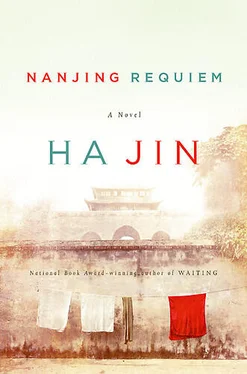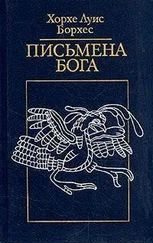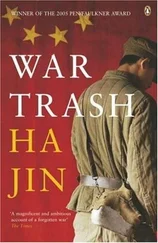The doctor has stopped the Metrazol treatment because it gave Minnie back pain and made her sore shoulders worse. Without any medical attention at the moment, she seems to continue recuperating.
October 20, 1940
(ALPINE, TEXAS)
We stayed at the Indiana state park for less than a month. Dr. Woods agreed to let me take her to my parents’ home in Texas. This is the only way I can keep watch on her while seeing my parents. Minnie likes the warm weather here and started helping my father in the garden. She wants to be “of some use.”
She often mentions Yulan, the mad girl in Nanjing, and says, “Who could imagine I too would end up unbalanced?” Sometimes she muses aloud, “I’m wondering how the Japanese will get their retribution for what they did in Nanjing.”
December 18, 1940
(ALPINE, TEXAS)
Minnie often claims that she will be confined in a mental hospital for good. She has been preparing gifts for Christmas. She has made a number of friends here, so she wants to surprise them with her gifts. Last week she sold two dozen fancy cards she brought back from China and donated all the proceeds, $12.50, to China Relief. Dr. Woods has instructed that we mustn’t give her any responsibility or remind her of the war atrocities.
January 25, 1941
(ALPINE, TEXAS)
Mrs. Robert Doan of the missionary society came to see Minnie. She found Minnie almost normal, she told me, and left two days later. She and Minnie seemed to have hit it off, and they often laughed when they were together. The other day we dined in a Mexican restaurant and Minnie even ordered her own food, which she hadn’t been able to do since last summer, as it was hard for her to make up her mind about almost everything. Before Mrs. Doan left, Minnie told us not to worry about her, saying she would get well soon and head back to China.
February 2, 1941
(ALPINE, TEXAS)
I was out of town for two days to see my sister’s twins. During my absence Minnie went to an emporium and bought thirty sleeping pills. When I came back, she was in a nasty mood and accused me of abandoning her. I said I had gone to visit my sister for just two days. “See, now I’m back with you,” I told her.
But she wouldn’t trust me. She took out the sleeping pills and popped them all into her mouth. I was horrified, and no matter how I begged her, she wouldn’t spit them out. I had to call for an ambulance to take her to the hospital.
I reported this incident to Dr. Woods immediately, and he urged me to take Minnie to a mental hospital in Indiana. The doctor emphasized that I must not accompany Minnie on the trip alone, so Mrs. Doan will come and together we will head for Indianapolis.
March 5, 1941
(INDIANAPOLIS)
Minnie didn’t enter the mental institution because Mrs. Doan found her another physician, Dr. Carter, who examined Minnie and concluded that she was recovering. The doctor resumed giving her hormone injections. Minnie has been staying in Mrs. Doan’s apartment downtown. In the morning she goes to Mrs. Doan’s office and helps her pack and label parcels to be shipped to China for refugees. In the evening they are together, reading, conversing, and going to the movies. Sometimes I join them. In every way she is getting better.
Mrs. Doan told me this evening that she was going to assign Minnie a more complicated job: selecting and filing articles on missionary education. Minnie likes the idea and feels that this will be a good way to get her mind back completely.
April 20, 1941
(INDIANAPOLIS)
Minnie is confident that she will go back to work at Jinling in the near future. In her letters to her friends she keeps asking everyone to pray for her. Dr. Woods and Dr. Carter both believe that she is recuperating. They are even allowing her to attend the International Convention of the Disciples of Christ in town. She is elated and is preparing to speak briefly on behalf of Jinling.
May 14, 1941
(INDIANAPOLIS)
Today when she was left alone in the apartment of Miss Genevieve Brown, the secretary of the missionary society, Minnie gassed herself by turning on all the jets on the stove. By the time I arrived at the hospital, she had passed away. We had her body shipped to a small church in the suburbs, where the chief pastor is a friend of Mrs. Doan’s. Minnie left a note saying that she ended her life this way because she was sure that she could never fully recover. She also mentioned that she had a will in a safety-deposit box in the bank.
For months Minnie had been expecting to hear from Jinling and to be invited back to China. The only letter that she received was two weeks ago, from her niece in Michigan, who was willing to take her in and care for her. Evidently someone had made an agreement with her niece, which Minnie construed as a means of abandoning her. After reading her niece’s letter, Minnie smirked. She was too proud to become a responsibility to others.
May 16, 1941
(INDIANAPOLIS)
We held a funeral for Minnie yesterday afternoon. Six people attended. The chief pastor read Psalm 23. No hymn was sung, since there were just the six of us. Mrs. Doan spoke briefly, saying: “Minnie Vautrin is also a casualty of war atrocities. She fought courageously and fell as a fighter.” I wish Mrs. Doan had said “as a hero.”
Minnie’s will was opened this morning. She had some savings in a Shanghai bank, 710 yuan in total, which she gave to Jinling as a fund for a scholarship. Also she donated to our college the 1.3 acres of land she bought last year. At the bottom of the will she had penned: “Jinling Forever!”
HALF A YEAR after Minnie’s death, the Japanese Imperial Navy attacked Pearl Harbor, and the United States went to war with Japan. The Japanese confiscated our college and deported Mrs. Dennison, Donna, and Alice. Our campus became a cavalry barracks for some years.
My family moved to a suburb, and Liya and I did odd jobs to get by. My husband, Yaoping, didn’t return until the Japanese were defeated. He’d lost half his teeth. In the meantime, my son-in-law came back once to see his wife and son, but he fled to Taiwan with the Nationalist army before the Communists seized power in 1949. Afterward he sent Liya a letter via Hong Kong and told her to remarry, for he couldn’t come back to the mainland anymore. He implied that he would form a new family in Kao-hsiung. “Life would be too short for such an indefinite wait,” he wrote. Liya took to her bed for weeks, though two years later she married a shop clerk and has lived an uneventful life since.
Owing to his past connections with the American professors, my husband was classified as an unreliable person by the Communists, but he remained at Nanjing University as a lecturer, unscathed by political shifts. Big Liu was not so lucky. When Searle Bates was leaving China in the spring of 1950, dozens of Chinese saw him off at the side entrance of the university, and Big Liu cried out in front of everyone, “Searle, come back someday. We will miss you!” Those words were reported as evidence of his reactionary outlook, and seven years later he was labeled a rightist who constantly dreamed of the day the American imperialists would take over China. For that he suffered bitterly for decades.
Ban also had rotten luck. He fled Jinling with Luhai and Meiyan and joined the Nationalist army in Hunan Province. He was captured by the Communists in the civil war and sent back to Nanjing, where he was made to labor at a brick kiln. I saw him once in the summer of 1951—he was tall but bent like an old man and had a gray widow’s peak, though he was not yet thirty. He called me Auntie and I only nodded, too sad to say a word. Probably luckier than him, both Luhai and Meiyan died in the war. He was killed by Japanese artillery, and she was shot dead by a sniper while she was rescuing a wounded soldier. Although she was named a martyr, her father still had to suffer by virtue of his closeness with the foreigners.
Читать дальше











